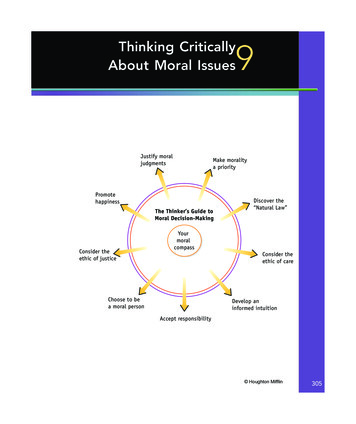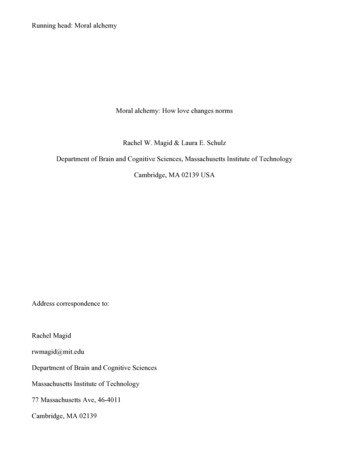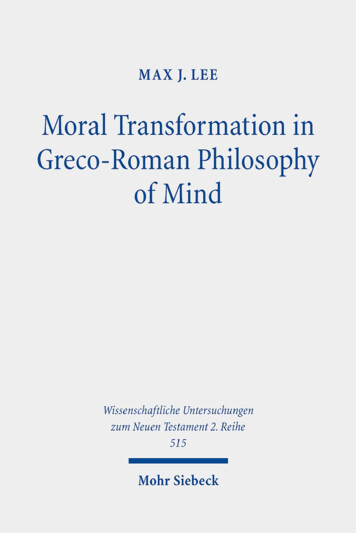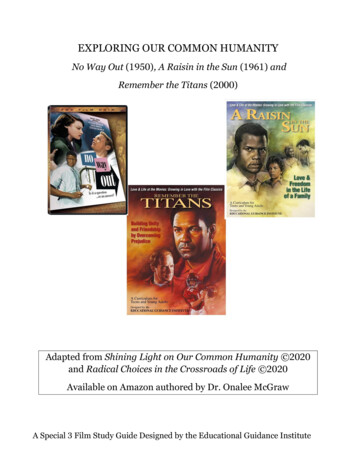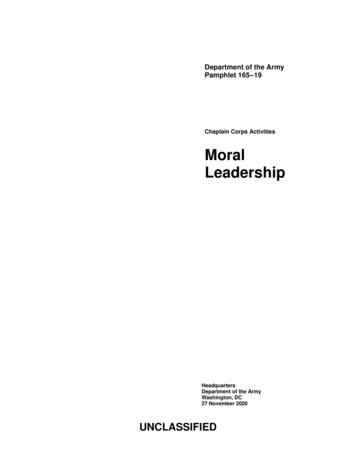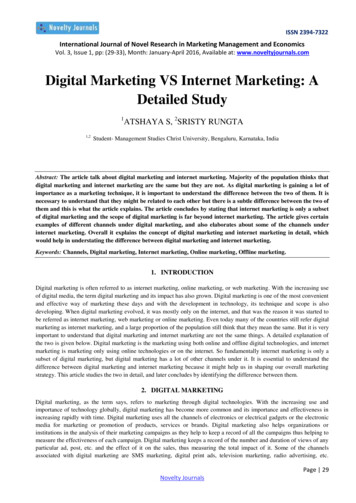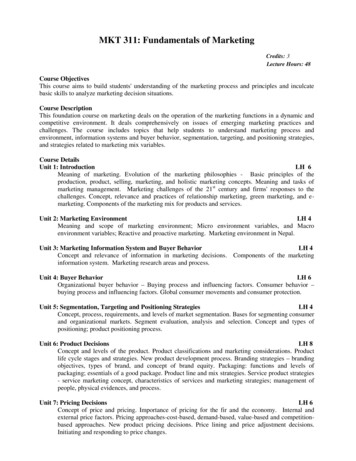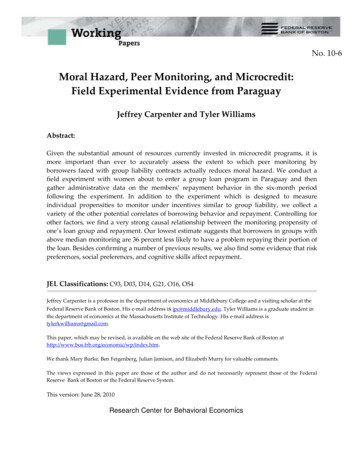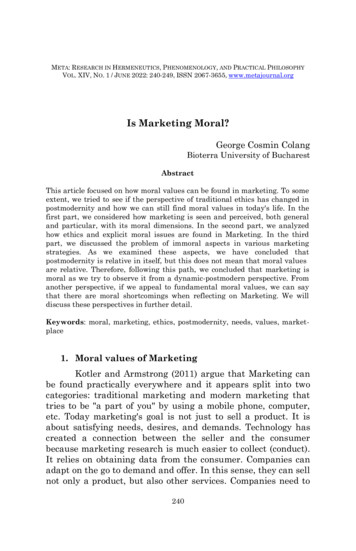
Transcription
META: Research in Hermeneutics, Phenomenology, and Practical Philosophy – XIV (1) / 2022META: RESEARCH IN HERMENEUTICS, PHENOMENOLOGY, AND PRACTICAL PHILOSOPHYVOL. XIV, NO. 1 / JUNE 2022: 240-249, ISSN 2067-3655, www.metajournal.orgIs Marketing Moral?George Cosmin ColangBioterra University of BucharestAbstractThis article focused on how moral values can be found in marketing. To someextent, we tried to see if the perspective of traditional ethics has changed inpostmodernity and how we can still find moral values in today's life. In thefirst part, we considered how marketing is seen and perceived, both generaland particular, with its moral dimensions. In the second part, we analyzedhow ethics and explicit moral issues are found in Marketing. In the thirdpart, we discussed the problem of immoral aspects in various marketingstrategies. As we examined these aspects, we have concluded thatpostmodernity is relative in itself, but this does not mean that moral valuesare relative. Therefore, following this path, we concluded that marketing ismoral as we try to observe it from a dynamic-postmodern perspective. Fromanother perspective, if we appeal to fundamental moral values, we can saythat there are moral shortcomings when reflecting on Marketing. We willdiscuss these perspectives in further detail.Keywords: moral, marketing, ethics, postmodernity, needs, values, marketplace1. Moral values of MarketingKotler and Armstrong (2011) argue that Marketing canbe found practically everywhere and it appears split into twocategories: traditional marketing and modern marketing thattries to be "a part of you" by using a mobile phone, computer,etc. Today marketing's goal is not just to sell a product. It isabout satisfying needs, desires, and demands. Technology hascreated a connection between the seller and the consumerbecause marketing research is much easier to collect (conduct).It relies on obtaining data from the consumer. Companies canadapt on the go to demand and offer. In this sense, they can sellnot only a product, but also other services. Companies need to240
George Cosmin Colang / Is Marketing Moral?maintain a close relationship with the customers becausepeople can make emotional based choices. Also, failing to meetvarying customer demands can cost a company as they mightlose clients to the marketing tactics of competitors. Nowadays,this is an effective method, as a customer’s information andinterests are much more accessible than ever before. Thepreviously mentioned facts are happening because these days,customers have easy access to information using the internet orsocial media. They can review others’ opinions and, in somecases, use the product for a trial.To provide the best customer service, Kotler describesfive general concepts (the production, the product, the sales, themarket, the social marketing). Those can be the basis of amarketing plan, applied in creating healthy relationshipsbetween the company and the customer. This method can resultin a long-term value, satisfied customers and a high profit thatremains constant for companies. Along these lines, the fivedimensions of Marketing embrace an axiological vision.At the same time, Baker and Hart (2008) state thateverything is in a constant motion. The supply must varybecause the needs are complex, and the demand is high. On theother hand, management is the one that supports theconnection between technology and people and implicitly theaxiological activity of companies.An essential principle of marketing is to be consumerorientated. Without considering that rule, there could be nospace for the sale relationship itself. Putting the consumersfirst, satisfying their needs, and maintaining a strongrelationship with them are the success factors for everymarketing strategy. It is a time-consuming process, and thecompany must combine good quality products with a reasonablylow production cost to ultimately make a profit. This practice,especially in social marketing, is about gathering axiologicalvalue and fair moral exchange between the parties, consumers,and companies (Donovan and Henley 2010).Human values are much more significant inpostmodernity. Marketing must embrace them and stoppromoting perfection but consider that people are imperfect.Individuals are more than just consumers. In this dimension,241
META: Research in Hermeneutics, Phenomenology, and Practical Philosophy – XIV (1) / 2022digital anthropology was born, helping companies find out theneeds of people: social listening, human behavior analysis, andempathic research (Kotler, Kartajaya and Setiawan 2017). Atthe same time, we must not forget that advanced technologydoes not bring moral progress. This logic is often used to hideimmoral or illegal intentions, pushing the boundaries / limits ofthe law. Technological progress, especially in anthropology andconsumer behavior studies, can be used against human dignity.After all, as Kant pointed out, everything comes down to humandignity.In the same line of thinking, the consumer societycannot exist if there are no moral precepts, if there is noaxiological framework - which regulates, above all, the businessworld. It is a perspective - not only an axiological one, but also apragmatic one. Without fundamental coherence, withoutappealing to moral values, economic activities could not occur,and social life could not exist. In these terms, moral values areessential. Although they are not palpable, they are not visibleto the naked eye, they represent the cardinal points of our lives,the principles that govern social life.Business ethics should also revolve around thisformalism if ethics revolves around axiology. In other words,business ethics should be based on what Bellu (2012) would call‘elementary morality’. If human relations did not have a pillarof support, then business ethics would not be possible either.Business ethics normalizes, stages moral values, and bringsthem to light beyond the interests of the actors involved, thusforcing them to keep the business field intact. Moreover,business ethics, seen as an elementary morality, is necessary.In a world dominated by immoral, barbaric politics, (Colang,2018), we need a moral framework, an honest game board notonly for those directly involved in business, but also for thoseactively involved in social life, such as consumers, employees,social groups, and local communities. They all should be a basefor setting the business ethics and the moral codes. Thus, inthis keynote, the business ethics research field was born. In theliterature – business ethics aims to regulate the rules andprinciples underlying economic activities. Some authors suggestthat business ethics is a pure philosophical speculation on242
George Cosmin Colang / Is Marketing Moral?economic principles. In contrast, others see it as an activity thatconsiders the deontological framework of economic activities.What is certain is, in one form or another, any economic activityis reduced to the way the client is seduced. Here hermeneuticsis essential to consumption and the phenomenology of theeconomic act – which involves deepening the practice in whichany economic activity is carried out. In essence, the action takesplace in the space of appearance, as we developed this topic inthe article A Hermeneutics of the Consumer (Colang 2011).Hence, we will discuss how postmodern relativism can misleadus, so that we tend to postulate that there is no ethics in theeconomical sphere and, therefore, no axiological frameworkeither.2. Moral relativismIn opposition to the ancient period where moral valueswere linked to goodwill (Aristotle 2020, EEII67a), inpostmodernity we have a moral relaxation in the sense thatethics is no longer absolute, but is relative. After all, startingfrom the Nietzschean relativism, postmodernity wants toemphasize subjectivism: “There are no moral phenomena at all,only a moral interpretation of phenomena.” (Nietzsche 2003, 96)Although it sounds contradictory, morality in marketing may ormay not be ethical in this context. How is this possible? It ispossible because postmodernity preserves the rigor ofmodernity, and implicitly, its values, will on the other hand,tends towards relativism. In other words, it is a moral gamebetween Descartes' and Nietzsche's vision, in which life as awhole can be viewed in the most abstract sense, but to the sameextent, it can be questioned at the level of social or moralnorms.For this reason, we have communication strategies thattend to seem ethical, but can still be moral. Following the samelogic, there may be communication campaigns that may beimmoral but viewed in a moral light. Moreover, we have manyexamples from business ethics, where we see different moraldimensions in immoral acts. It is all about retouching inmarketing and communication.243
META: Research in Hermeneutics, Phenomenology, and Practical Philosophy – XIV (1) / 2022Another relevant aspect of business ethics and howmarketing can be considered moral, is a Kantian moral duty.Postmodernity instead, influences perspectives at the level ofcommunication, but does not penetrate deeply into the moraldimensions. Simply put, Kantian moral duty is present inbusiness, but it can be relativized from the perspective of JohnStuart Mill's communication and utilitarianism. After all, R.M.Hare tried to achieve this, by bringing deontology into the spaceof utilitarianism. This means that business in today's worldkeeps a moral note, but is also pragmatic. Furthermore, wecannot say that society is profoundly immoral and relative.Instead, we have, as Bauman shows, a moral doubt anddifferent perspectives on perceiving this cultural relativism,however this doesn’t mean that we no longer have ethics, butrather a moral perspective (Bauman 2009).Following this logic, we can state that relativism israther cultural. Anything derived from this cultural relativismcan only be relative. Therefore, we can firmly say that moralvalues are not relative, but their interpretation is. Thus, evenin Nietzschean logic, perspectivism is the one that misleads usand makes us say that there are no ethics. After all, if we statethat everything is relative, this statement is also relative. Werefer inherently to specific values (epistemological, axiologicaland so on). Indeed, we cannot live without moral values, whichmeans life has an axiological attribute.Ontologically speaking, we are desperately looking forvalues without realizing that the paradigm of postmodernitymeans a lack of values. If everything is relative, as you hear atevery corner, then there are no more moral norms, and if this istrue anything is possible. You can love and cheat, you can stealand be honest, it doesn't matter. You can steal and be honest.Postmodernity allows you to violate the Manichaeanism of theprinciple of non-contradiction, and that is a fact. You can doanything because it doesn't matter. It is enough to simply lookon the street, where cultural relativism is already normalized.We do not say these things in a moralizing tone, but in adescriptive one because, in postmodernity, it no longer makessense to talk about values if there are no more values or ameaning of those values. This is the current paradigm,244
George Cosmin Colang / Is Marketing Moral?postmodernity, and the logic of super-human, when it comes toperfect ourselves, we will be completely devoid of feelings.Orwell's deep fear of not turning us into machinery will soon beattained. Now all that's left is a nano-technological discoverythat puts us in God's place. And when we get there, we willrealize that we are just human beings, but it will be too late.Religion gives you immortality in various forms. Politics tellsyou that everything can be at your fingertips, and sciencepromises you in epistemic terms what religion promises indogmatic terms. Ethics is the only field that promises nothing,it is not a profitable concept and that’s why at times certainindividuals choose to avoid it.3. Immoral strategies of MarketingMarketing is more than meets the eye. Over time twopatterns have emerged. During the first, marketing is promotedaggressively, while the process of production and consumptioncamouflages the second. In the footsteps of Max Weber,Applbaum (2004) states that marketing has a special place inthe economic and cultural development of capitalism.Big companies want to have more benefits rather thantake into account the needs of people. In such a way, theconcept of marketing is unfortunately often omitted. Thefollowing problems arise: prices, brand name use, misleadingconsumer practices, aggressive ways of promotion, poor productquality, premature ageing of the product, and making adifference between social classes. In contrast, some companiespromote the sustainability concept. This encourages theconsumer to value what they already have and the moralvalues. Thus, they discourage consumerist thinking that canlead to the deprivation/erasure of the common good and affectsociety as a whole. Another immoral aspect is that throughvarious less ethical marketing tactics, larger companies lead tothe absorption of smaller companies, resulting in higher profits.(Kotler, Armstrong, and Harys 2020).Evans and Moutinho (1999) show us that ethicaldecision-making occurs when a moral constituent is noticedwithin a problem. Ethical problems arise when companies thinkof their welfare: to make as much profit as possible and achieve245
META: Research in Hermeneutics, Phenomenology, and Practical Philosophy – XIV (1) / 2022their goals even if it is not suitable for consumers. Issues alsoappear when they try to destroy other competitors. The mostcommon problems are misleading advertising, manipulativeand insistent sale channels, prices that insinuate to favor theconsumer, etc.On the other hand, imposture also appears becausepostmodernity takes place in the space of excessive relativism.Not only companies tend to evade things, but also people. It is aconsumer society that is somehow reduced to a kind ofrelativism given by the market: "While he was impressed by theproductivity of free markets, Adam Smith feared their moralhazards." (Gray 2008, 121) In this sense, if the society does nothave a general axiological direction, i.e., directed toward moralnorms, all the society's actors will tend to relativize the socialgame. Huizinga was telling us that even the game needs firmrules to exist and unfold, to be genuine, rigorous, and truthful.Therefore, the general tendency towards moral decline – is notan exclusive attribute of the pecuniary, of the economic zonebut rather reflects the barbaric nature of man, his naturalinclination to fake things and not to follow the rules. There is,however, to a degree a difference: one is when a person isimmoral out of necessity and does not respect the moral rules,and another is when several companies aim to deceivecustomers. This is why it is evident that the negative impact onsociety is better seen when we consider the false practices ofcompanies. In other words, we cannot speak of an axiologicaldecline but instead a moral hazard, as Adam Smith asserted.In a way, postmodernity must be understood in itsrenaissance key, or even better in a Dostoevskyian key withadded Nietzschean fervor. This will give us the picture ofmodern life. In antiquity, the foundations were laid for whatChristianity carried forward in the form of dogma. Moreprecisely, the axiological skeleton of the world, its valuefoundation, was outlined. Whether there were gods,philosophers or priests, all in their specific language, wereconvening, that we cannot function without moral laws. Thismeans that before religion, by law, some moral norms wereoutlined, which were then taken over by the conceptual frames(apparatus) and transformed into means for political, doctrinal,246
George Cosmin Colang / Is Marketing Moral?religious, and legislative ideologies. And yet, for those who donot understand how we conduct our lives, there is a simpleanswer - beyond any legal or religious foundation - it is anaxiological, moral fundament of life.4. ConclusionThis article argued the idea that morality inpostmodernity, although relative, does not mean relativizingmoral values. Therefore, moral values remain known associety's goals. Despite the fact that postmodernity allows us tosee all aspects of life, including the economic ones, subjectively,rules must exist in order to have a moral frame in the market.To draw an answer to the question that represents the title ofthis article, we can say that marketing is moral as long as it isnot ethical. In what sense? In the sense of a minimal moralityof our living day by day, but in the essence, it is clear that thereare some ethical deficiencies. In a matter of speaking,postmodernity allows the principle of non-contradiction to beignored, more precisely, to be or not to be moral simultaneously.Also, we can interpret this on a pragmatically level not just onan ontological one.Drawing the line of this article, the discussion of ethicsin Marketing is closely related to the fact that postmodernismtakes place in the space of post-truth. While a strategy tends tobecome immoral, from an axiological point of view, also it canbe interpreted - at the level of perception of the masses - asmoral. Furthermore, this is possible because today's society isdeeply relativized in a Nietzschean paradigm, where values arevolatile. We are, somehow, in a dimension where anything ispossible, but more than that, anything is allowed. At the sametime, we live in a technological world, where information ispresent at every step. At the societal level, the tendency in thischain is to omit, to no longer perceive the axiologicalbackground without appealing to moral values. In a way,following Baumann's logic, postmodernity is relative, but theethic cannot be relative. So, morality (mores) is relative at thelevel of projection of Marketing, but the ethic (ethos) can neverbe relative because that goes beyond any communication orpromotion strategy.247
META: Research in Hermeneutics, Phenomenology, and Practical Philosophy – XIV (1) / 2022REFERENCESApplbaum, Kalman. 2004. The marketing era: from professionalpractice to global provisioning. New York and London:Routledge.Aristotle. 2020. The Nicomachean ethics. Translated by AdamBeresford. London: Penguin Random House.Baker, Michael J., and Susan Hart. 2008. The Marketing BookSixth Edition. Jordan Hill, Oxford: Elsevier Linacre House.Bellu, Niculae. 2012. Dimensiunea morală a existenței umane: ocercetare ontologică. Bucureşti: Editura Paideia.Colang, George. 2011. “A Hermeneutics of the Consumer.”Annals of “Ştefan cel Mare” University of Suceava: Philosophy,Social and Human Disciplines Series I: 109-112.Colang, George. 2018. Dimensiuni și perspective etice asuprabarbariei actuale. București: Eikon.Donovan, Rob, and Nadine Henley. 2010. Principles andPractice of Social Marketing: An International Perspective. NewYork: Cambridge University Press.Evans, Martin, and Luiz Moutinho. 1999. Contemporary issuesin Marketing. Hampshire and London: MacMillan Press LTD.Gray, John. 2008. Black Mass. Apocalyptic Religion and theDeath of Utopia. London: Penguin Books.Kotler, Philip et al. 2020. Principles of Marketing. EightEuropean Edition. Pearson Education Limited.Kotler, Philip, Hermawan Kartajaya, and Iwan Setiawan. 2017.Marketing 4.0: Moving from traditional to digital. Hoboken(NJ): John Wiley & Sons.Kotler, Philip, and Gary Armstrong. 2011. Principles ofMarketing. New Jersey: Pearson Prentice Hall.Nietzsche, Friedrich. 2003. Beyond good and evil. London:Penguin Books.248
George Cosmin Colang / Is Marketing Moral?Zygmunt, Bauman. 2009. Does Ethics Have a Chance in aWorld of Consumers? London: Harvard University Press.George Cosmin Colang is PhD lecturer at the Bioterra University ofBucharest, Romania. His research interests are the applied ethics,hermeneutics and phenomenology. His recent publications concern thebusiness ethics, the academic ethics and the existentialism.Address:George Cosmin ColangBioterra University of Bucharest81, Garlei Str., Bucharest, RomaniaE-mail: georgecolang@yahoo.com249
axiological framework - which regulates, above all, the business . not only an axiological one, but also a pragmatic one. Without fundamental coherence, without appealing to moral values, economic activities could not occur, and social life could not exist. In these terms, moral values are . marketing can be considered moral, is a Kantian .

